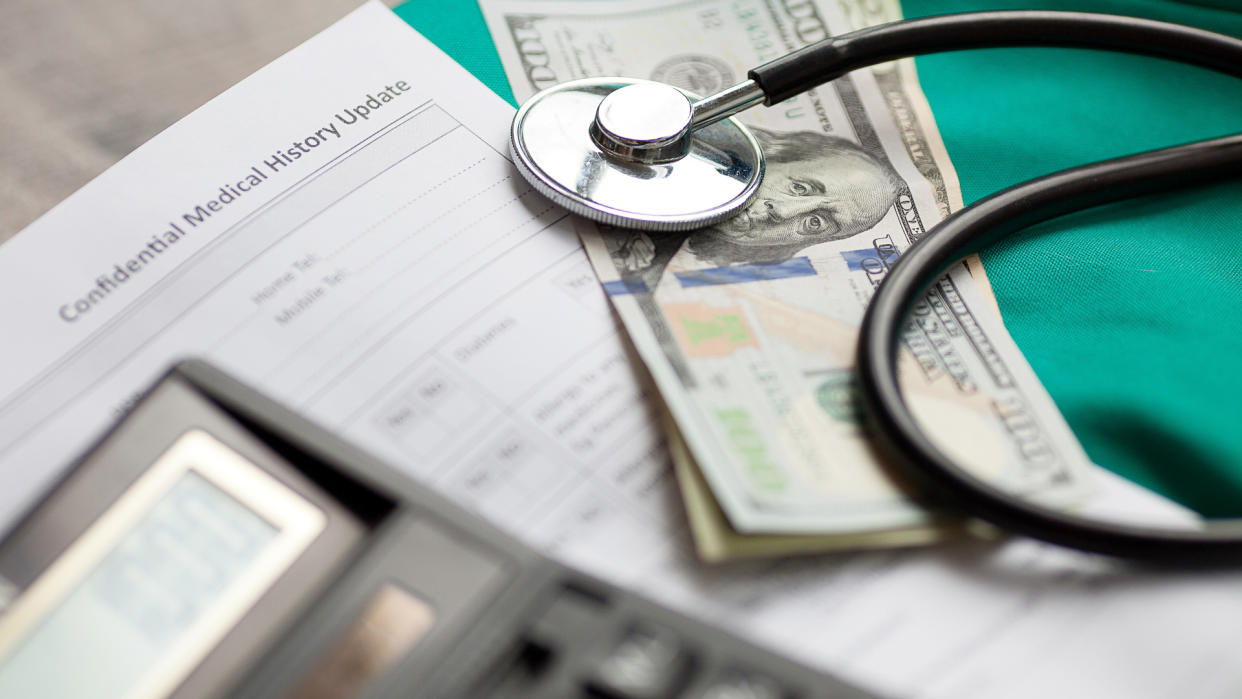6 Ways To Lower Your Medical Bills If You Don’t Have Insurance

Medical care is expensive. And, when you don’t have insurance, it can be frightening to think of the financial fallout you might suffer from an unexpected trip to the doctor or hospital.
David Silverstein, author and founder of Amaze Health, said uninsured Americans are often middle-income households — those whose household income is too high to qualify for assistance and too low to afford worthwhile medical coverage.
Related: Millions of Americans Have Medical Debt in Collections — What Can You Do to Avoid It?
Also See: How the CareCredit Credit Card Can Help You Pay for Medical Expenses When Your Health Insurance Won’t Cover the Bill
“These families are not paupers,” Silverstein said. “They own homes; they have savings accounts and IRAs — and they are at risk of losing everything due to one large medical bill. Navigating the American healthcare system without the benefit of insurance is a life skill that many Americans need, but few have.”
To help, here are six ways you can lower your medical bills if you don’t have insurance — straight from the experts.
Shop for Doctors, Urgent Care Facilities and Hospitals
“Hospitals and doctors charge different amounts for a visit,” said Tyson Parker, a healthcare consultant with James G. Parker Insurance Associates. “It is critical to call around and find out the average cost for an appointment before you get sick, so you know which place is the least expensive when you actually need to seek care.
“If you wait until you are sick, you will just go to the first one you find. For example, different urgent care facilities will have different prices for an appointment. …
“Hospitals and surgery centers have several prices for each procedure as well. Without a network, you can go anywhere you want. Eighty-five percent of surgeries are planned, so take the time to make the calls beforehand and save the money.”
Money Back: Medical Expenses You Can Deduct From Your Taxes
Negotiate Your Medical Bills
“All medical bills are negotiable,” said Gail Trauco, a 43-year oncology nurse and founder of Medical Bill 911. “Polite persistence is a powerful tool to negotiate a medical bill. All hospitals have charities, endowment funds and grants. Non-profit hospitals have exceedingly large resources available, especially children’s hospitals. Tell your story and state that you have a financial hardship. Ask who you need to speak with and contact them via phone. Establish a polite, courteous verbal conversation to discuss your need in detail.”
Trauco cautioned that medical bill negotiation requires time and commitment.
“Your level of success in negotiating a bill is directly related to the amount of research and effort invested,” she said. “Ask for a ‘pay now’ discount which reduces your bill, and your negotiated amount will be considered as paid in full. Generally, discounts are 10-20%.”
Bad News: Employer Health Insurance Premiums Have Risen 22% in 5 Years and Wages Can’t Keep Up
Trauco also said that you can choose to hire a patient advocate experienced in medical bill negotiation. “Fees are generally 20-30% of the amount they are able to reduce your medical bills,” she said.
Be Proactive When It Comes to Prescriptions
Here is Silverstein’s advice regarding prescriptions.
“Ask the doctor to write ‘generics approved’ on the script,” he said. “That way they don’t have to look it up or know all the details. You can work with the pharmacist on options if the prescription reads ‘generics OK.’
“Be ready to do a simple web search using something like GoodRx. It will take seconds to look up your prescription while you are still in the doctor’s office. Doctors often have no idea what drugs cost. Show them. That’s the only way you will get them to discuss alternatives. Once you leave the office, it’s too late.”
Research Independent Imaging Centers Ahead of Time
“Understand that 90% of all imaging (X-ray, CT scan, MRI) is a commodity,” Silverstein said. “Every market has a few independent imaging centers. Even if you are not sure what will be ordered, make sure you know where the independent imaging centers are that offer discounted cash prices in your area. Ask to have your imaging order sent there.
“You don’t have to shop it around later. You can do the shopping ahead of time by anticipating what might be ordered.”
Tips: How To Prepare for Being Kicked Off Your Parents’ Health Insurance
Use an HSA or FSA To Save on Unpredictable Health Expenses
“Talk to your employer about an HSA or FSA, which you can fund with pretax dollars from your paycheck,” said Michael Botta, a health cost expert who assisted with the creation of Obamacare and co-founder of Sesame. “When unpredictable expenses come up, you can apply money from your HSA or FSA toward any medical bill.
“If your employer doesn’t offer one, create one on your own or talk to your employer about sponsoring one for employees. Companies like HSA Bank and Health Savings Administrators offer individually funded HSAs, and you can set up a regular contribution from your paycheck.”
Save the ER for Emergencies
“Emergency rooms play a critical role for health care; and, for any emergency, you should always call 911 and/or go to the ER,” Botta said. “However, many times the ER is still top of mind as the best place to go for care (even when it’s not an emergency) — but it doesn’t need to be. Consider urgent care in non-emergency instances to keep costs lower. Many local urgent care facilities are open 24 hours, and urgent care telehealth is available any time for diagnosis and recommendations on how to follow up.”
More From GOBankingRates
Target, Amazon and 4 More Retailers That Will Reward You for Turning In Your Old Stuff
How Much Money You Should Keep in Your Standard Savings Account, According to Experts
This article originally appeared on GOBankingRates.com: 6 Ways To Lower Your Medical Bills If You Don’t Have Insurance
